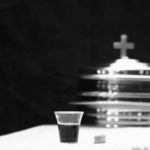Nick Batzig, in an article “Communing with Christ in the Supper” writes:
Recently, a video of Francis Chan surfaced in which he tries to explain what he now believes about the real physical presence of Christ in the Lord’s Supper. Without wishing to dissect the many erroneous arguments Chan made about the unity of the visible church throughout the first fifteen hundred years of church history and the role of preaching in the early church, I do wish to make a few observations about his misplaced statements about how the Supper was viewed throughout church history–and especially by a few of the leading sixteenth century Protestant and Reformed theologians.
Chan insists that the church unanimously accepted the idea that the bread and the wine become the real physical body and blood of Jesus. He says, “for the first fifteen hundred years of church history everyone saw it as the literal body and blood of Christ.” This is to fail to understand that the theory of transubstantiation was first formulated by the ninth century Benedictine monastic abbott, Paschasius Radbertus, and adopted as Roman Catholic dogma at the Fourth Lateran council in 1215. In his article “The Meal that Divides,” Keith Mathison gives a helpful survey of the development of Radbertus’ doctrine of transubstantiation and an explanation of the controversy between Radbertus and Ratramnus over the presence of Christ in the Supper in the ninth and tenth centuries.
Chan then blames the Protestant Reformation for divisions that exist in the church–largely with respect to the Lord’s Supper. He says, “it wasn’t ’til five hundred years ago that someone popularized a thought that it’s just a symbol.” Of course, this is a failure to understand the contention between Luther and Zwingli–as well as the distinctions between the view of Calvin and the members of the Westminster Assembly.
The debate between Luther and Zwingli was not–as so many have wrongly taught–that of the distinction between the real presence of Christ and a mere symbol. The debate centered on the distinction between the real local (i.e. earthly physical) presence of Christ and the real spiritual presence of Christ. Luther believed that the physical body and blood of Jesus was “in, with, and under” the bread and the wine. In this way, Luther sought to distinguish his view (i.e. consubstantiation) from the Roman Catholic view of transubstantiation. The problem with Luther’s view, as Geerhardus Vos explained, is that it adopts a faulty Christology to explain the Supper. According to the Lutheran view, the divine nature of Christ must really and truly communicate to the human nature something that does not properly belong to it–namely, omnipresence. Vos explained,
“If Christ, also according to His humanity, is present in and with bread and wine, wherever these are used, then in every instance a power must be communicated to the humanity that it ordinarily (outside of Christ) does not possess. The doctrine of the Lord’s Supper thus presupposes the communication of something by the deity to the humanity.”1
Zwingli and the Swiss, by way of contrast, insisted that the Supper was symbolic and that it was the spiritual and sacramental presence of Christ that accompanied the bread and wine. Zwingli’s aversion to Luther’s view was not in the real presence of Christ but in the real local bodily presence of Christ in the Supper. In chapter 4 of his Exposition to the Christian Faith, Zwingli stated,
“The body of Christ is, therefore, not eaten by us, literally or in substance, and all the more not quantitatively, but only sacramentally and spiritually…He is not to be looked for in the world according to His humanity in literal, substantial, bodily presence, but only in a spiritual and sacramental sense.”2
The distinction that existed between Calvin and the Westminster Divines regarded the question of whether it was the heavenly corporal presence of Christ or the earthy spiritual presence of Christ that was appropriated by believers in the Supper . According to Calvin, the Holy Spirit lifts believers into heaven to spiritually feed upon the body of Christ by faith. Calvin wrote,
“Greatly mistaken are those who conceive no presence of the flesh in the Supper unless it lies in the bread. For thus they leave nothing to the secret working of the Spirit, which unites Christ himself to us. As though, if he should lift us to himself, we should not just as much enjoy his presence!” (Institutes, 4.17.31)
In his commentary on 1 Corinthians 11:24, Calvin explained,
“Hence the bread is Christ’s body, because it assuredly testifies, that the body which it represents is held forth to us, or because the Lord, by holding out to us that symbol, gives us at the same time his own body; for Christ is not a deceiver, to mock us with empty representations. Hence it is regarded by me as beyond all controversy, that the reality is here conjoined with the sign; or, in other words, that we do not less truly become participants in Christ’s body in respect of spiritual efficacy, than we partake of the bread.”3
Robert Letham explains Calvin’s view of the heavenly presence of Christ in Communion, when he writes,
“Christ does not come down to us in his body and blood. Instead, we are lifted up to him by the Holy Spirit. Christ, being the eternal Son of God, is of course, everywhere. Moreover, he has permanently united himself to the human nature assumed in the incarnation. In that sense, the person of Christ is present with us as we eat and drink. Yet, on earth, the Son of God was not restricted or confined to the humanity he assumed, but was simultaneously filling all things, directing the universe even as (according to the flesh) he walked the dusty roads of Palestine. So, at the right hand of God, the Son fills and directs the universe (Col. 1:15-20), now unbreakably united to his assumed humanity, while in terms of that same humanity he is limited and in one place. Yet that humanity is never separate or apart from the divinity, the eternal Son of God with whom and in whom it is one undivided person. Thus, in the sacrament the Holy Spirit unites the faithful to the person of Christ as they eat and drink the signs, the physical elements of bread and wine. There is an inseparable conjunction of sign and reality. As truly as we eat the bread and drink the wine, so we feed on Christ by faith.” (Robert Letham, The Lord’s Supper, 28-29).
This, however, did not mean that Calvin did not also accept a memorial aspect of the Supper. Hughes Oliphant Old–in what is the greatest historical treatment of the Lord’s Supper in the Reformed tradition–explained the dual aspect of the Supper as understood by Calvin, when he wrote,
“What we need to notice is that there is tension between understanding the Lord’s Supper as memorial and the Lord’s Supper as communion. Celebrating the Lord’s Supper as memorial assumes Christ’s absence, while celebrating the Lord’s Supper as communion assumes his presence. The way Reformed piety comes to reconcile the two will be by means of typology. In one case we are dealing with the Passover typology (Exodus 12 and 13); while in the other we are dealing with the Sinai typology (Exodus 24), the meal up on the top of the mountain.
Calvin sees the problem clearly. In his commentary on 1 Corinthians 11:24 he says, “This do in remembrance of me…Some draw the inference from this phrase that, in these circumstances, Christ is not present in the Supper, because there can only be a memorial (memoria) of something that is absent.” Calvin admits this to be true in a certain sense. Christ is not visibly present. He does not leave his place in heaven, and yet when he is remembered the efficacy of his saving work is established among us. This is a kind of presence implied by the word “memorial,” but this is not the last word. As Calvin presents it, we must think of the Supper as communion as well as memorial. We find both words used in the New Testament to speak of the Supper, and as we have been saying, there are a number of words given by Scripture to explain the sacrament.”4
By way of nuanced distinction, the Westminster Confession of Faith teaches that believers really and truly feed on Christ by faith as He is spiritually present in the Supper. They explained that this is not a feeding on His physical flesh and body, but spiritually receive an application of the saving benefits of His death, when they wrote,
“Worthy receivers, outwardly partaking of the visible elements, in this sacrament, do then also, inwardly by faith, really and indeed, yet not carnally and corporally but spiritually, receive, and feed upon, Christ crucified, and all benefits of His death: the body and blood of Christ being then, not corporally or carnally, in, with, or under the bread and wine; yet, as really, but spiritually, present to the faith of believers in that ordinance, as the elements themselves are to their outward senses” (WCF 29.7).
Chad Van Dixhoorn summarizes the teaching of the Westminster Assembly on the presence of Christ in the Supper, when he states,
“‘The body and blood of Christ’ is not during the supper ‘corporally or carnally, in, with, or under the bread and wine’. Christ is not present in the body or in the flesh. No Catholic, or Lutheran, or ‘high Anglican’ formula of real presence in the sense of physical presence is correct. But nor are these doctrines necessary! Spiritual does not mean artificial. Spiritual realities are true realities. And so this confession rightly insists that Christ is present ‘really, but spiritually’ in the supper. He is as ‘present to the faith of believers in that ordinance, as the elements themselves’ are present ‘to their outward senses.’”5
The Scottish theologian, Robert Bruce (c.1554-1631), explained the relation between receiving Christ in the preaching of the gospel and the partaking of the Supper, when he wrote,
“That same thing which you possess by the hearing of the Word, you now possess more fully. God has more room in your soul, through your receiving of the Sacrament, than He could otherwise have by your hearing of the Word only. What then, you ask, is the new thing we get? We get Christ better than we did before. We get the thing which we had more fully, that is, with a surer apprehension than we had before. We get a better grip of Christ now, for by the Sacrament my faith is nourished, the bounds of my soul are enlarged, and so where I had but a little of Christ before, as it were, between my finger and my thumb, now I get Him in my whole hand, and indeed the more my faith grows, the better grip I get of Christ Jesus. Thus the Sacrament is very necessary, if only for the reason that we get Christ better, and get a firmer grasp of Him by the Sacrament, than we could have before.”6
Explanations about the presence of Christ in the Supper have been vast and nuanced throughout church history. However, the fact that Evangelicalism (broadly defined) has failed to acknowledge the real spiritual presence of Christ in the Supper is the bad fruit of nineteenth century Revivalism–rather than the careful exegetical labors of sixteenth century Reformation. For the Reformed (broadly defined), the Supper is both memorial and communion with Christ. Christ’s physical body is located solely in heaven until He comes again. However, by the Holy Spirit, He is present with His people in the means that He has appointed for their spiritual growth in grace–no less in the Supper than in the preaching of the word.
1. Geerhardus Vos, Reformed Dogmatics, ed. Richard B. Gaffin, trans. Annemie Godbehere et al., vol. 3 (Bellingham, WA: Lexham Press, 2012–2016), p. 66.
3. John Calvin and John Pringle, Commentaries on the Epistles of Paul the Apostle to the Corinthians, vol. 1 (Bellingham, WA: Logos Bible Software, 2010), 378.
4. Hughes Oliphant Old Holy Communion in the Piety of the Reformed Church, ed. by Jon D. Payne. (Powder Springs, GA: Tolle Lege Press, 2013) pp. 69-70.
5. Chad Van Dixhoorn “Through the Westminster Confession, 29.7-8,” on Reformation21, August 3, 2013 https://www.reformation21.org/confession/2013/08/chapter-297-8.php
6. Robert Bruce, “The Sacraments in General,” in The Mystery of the Lord’s Supper: Sermons on the Sacrament preached in the Kirk of Edinburgh in A.D. 1589, ed. Thomas F. Torrance (Richmond, VA: John Knox Press, 1958), p. 64.



